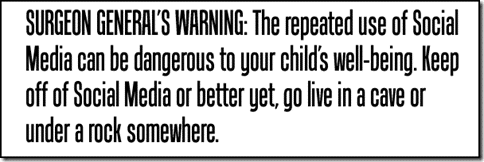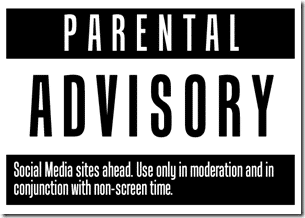WARNING: The repeated use of Social Media can be dangerous to your child’s well-being. Should we have a Surgeon General’s warning label slapped onto each and every social media site out there? What about some sort of age rating system like we have for movies, music and video games? No, of course not. The Internet is all about freedom of speech and expression and is a wealth of knowledge. But we all continue to get the message that social media is dangerous for children. Even I have written a couple of articles to that effect.

But as I reflect on it and watch how my children use social media, I wouldn’t be a balanced parent if I didn’t look at both sides of the argument. Sure, social media can be dangerous to children, but there are lots of caveats to that statement. In fact, the statement needs to be really qualified. “Unmonitored” social media makes that statement much more true than without the descriptor. But I won’t be dissecting that statement. Instead I will offer one that is potentially controversial: Social media might actually be good for your child.
I’d like to preface my reasoning however. I am not saying to just turn your child loose on social media. I am, however, saying that not all aspects are dangerous to them. In fact, I believe that some social media, in moderation, can have a positive influence on a child’s life.
5 Reasons Why Social Media can be Good for a Child
Below are 5 reasons to consider as to whether or not your child should use social media. Remember, it does depend on the age of the child, their emotional maturity and how much time you as a parent can devote to coaching them, so I’m not condoning signing your 4-year old up for Facebook. Twitter, maybe.
1) Keep up with friends
Social media is, in fact, social, despite the critics saying that it promotes a lot of individual screen time on computers and smartphones. There is a definite generational gap between kids, parents and grandparents now. Children are now growing up with screens as an integral part of their lives, like it or not. Their parents (my generation) are in that gray area, some believe in technology while others do not. And many grandparents find the whole idea of technology to be completely foreign, complicated and isolating.
My kids text their friends consistently (texting could be viewed as possibly the lowest form of social media). Depending on their age, many kids share things with their peers who are longer distances away. As I child, I remember talking on the phone with my friends for hours…that was our form of low-tech social media. I guess if you go back far enough, the “party line” was our grandparents form of social media…but that might be a stretch.
Kids are quickly adapting to new apps and social services that allow them to keep in touch with their friends, regardless of distance or time of day. Having playdates…er sorry, my kids have corrected me recently…playdates are for little kids. They are now called “hangouts” (hmmm, did Google know this before they did?). Anyway, having hangouts isn’t always practical. And this is where a little bit of online socialization can keep the relationships strong and current. Instead of physical hangouts, they have digital ones.
2) Collaborate with schoolmates
Believe it or not, my 9 year old actually uses FaceTime to do her homework with her classmates. This could be done with Skype or via a Google Hangout or whatever, but the idea is that it is social and it is using technology. This also could be viewed as just a new form of communication, much like the phone call was to us parents.
Interestingly, in my kids’ elementary school, they are using Google Docs to collaborate on schoolwork, to leave comments and respond to questions from their peers. This is being taught as part of the course curriculum as I believe that it should. But the interesting thing is, children are already doing this online collaboration naturally.
My oldest daughter, in fact, is home-schooled due to the demands on her time imposed by her ballet practice. All of the collaboration, student-teacher & student-student, takes place online. (Interestingly, however, in order to balance online with face-to-face time, there are physical meetups occasionally.)
3) Discover new interests
One of the great byproducts of social media is the fact that new “things” are shared all of the time. This is an area where potential dangers lie, especially if kids have unmonitored access to any type of social media that they want. However, this is also the area of discovery. One of my daughters learned how to make duct tape wallets, cases and decorations by watching YouTube videos that she discovered on her own. My oldest daughter uses various social media services to find more about ballet, the art of dance or culture in general. She follows many ballet dancers and gets a better vision for her own performance art.
Social media enables discovery and learning in ways that we could never have imagined before. Without it, the exposure to new ideas would be must more limited I believe.
4) Get prepared for the future
As I mentioned in a previous point, schools are starting to teach children how to use online tools and how to interact with their peers online. As these kids are the tech-connected generation, the ones with smartphones and computers as common as the plain old corded telephone was for my generation, we have to prepare them for the future. To be competitive in the new ways of business, they need to view technology as a tool for success in the world. Obviously, this depends on what their interests are and what type of access they have to technology. But that is the subject of another conversation.
Social media has turned traditional marketing upside down. Instead of traditionally blasting a single message to the masses, with social media, it is all about the conversation, the engagement and the trust that comes from the social relationship. Kids get this. They want the personalization. They understand it and they are growing up with it. And, I believe that is preparing them for the future so that they can discern the difference between someone spamming them with a false message and someone else being truthful and genuine. Because they are growing up with this now, via the online social interactions they are having, they will be even more capable as they mature. I feel that those who do not have exposure to social media as children, will potentially have a harder time adapting to it as adults. Of course, that may be absolutely fine for them. It’s a personal choice. But think about that child who was denied sugar or TV as a child (I was that child)…as soon as they are free, the pendulum swings the other way – can you say sugar cereal and Saturday Morning cartoons?
5) Get creative
This last reason is probably the most interesting. Picture sharing social sites are incredibly popular. Even traditional text-oriented social media services have incorporated images into their offering and have made them even more prominent than before. My kids spend a lot of time creating that perfect picture to take, choosing the best filter to apply, dreaming up the most inspiring words to write and identifying the best hashtag to use when they share their artistic creation. I personally love this creativity. Even when we go to walk the dog, they have their artistic glasses on. Social media has brought out the creativity in people and kids are adopting this without even thinking.
This new creativity, I believe, is inspired by both technology and social media. They now have the tools in their hand to create something fantastic and, of course, they also now have the means to share their creativity with the world via social media.
Reading the Fine Print
As I mentioned earlier, don’t just turn your kids loose when it comes to social media. You must act as a coach and mentor. Work with them. Don’t let them do it alone. Unsupervised, social media can be dangerous potentially, either from online predators or from bullying from their own peers. Both of these are psychologically destructive to children and some can be physically dangerous as well.

Here’s my quick advice:
- Limit their screen time
- Audit what they do
- Ask them “why” they want to join social media and why they are sharing what they share
- Learn who their friending
- Allow them to do it only after schoolwork, chores and other tasks done
- Let them know that you are willing to answer their questions
- Spend time with them without gadget and social media
So I’m curious, would you or do you allow your kids to interact with social media? What do they have access to? How do you control what sites they join and what they do or say there? Do you feel that you are being over-restrictive or do you think that you are not doing enough? Leave a comment! This is, after all, as social discussion.
HTD says: Social media has truly changed our lives, and since our kids are growing up with it, we might want to allow them to use it more.



3 comments
shriy
thanks fir this lovely and inspiring …………. I love it
and its wonderful
visit http://www.suwwa.com
for the tech world news
Person
Can you write a list why social media is good?
iyas
My kids have learned piano from Youtube and connected with kids on other continents. Opportunities I didn’t have when I was growing up. They also would happily stay online all day if left to their own devices. Social media and tech is an essential part of their lives if they are to participate with some of the biggest trends not only socially, but also academically and professionally in the future, but as with all else, it’s the balance that’s key. The opportunities are as immense as the temptations.